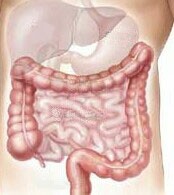Women With IBS Unable to Switch Off Pain Response
Finding could improve understanding of irritable bowel syndrome and lead to new treatments.
|
E-mail this article
Subscribe to news
Printer friendly version
|

(SOURCE: University of California, Los Angeles, news release, Jan. 8, 2008)
WEDNESDAY, Jan. 9 (HealthDay News) -- Women with irritable bowel syndrome anticipate and react to pain differently than women without IBS, a new study suggests.
The University of California, Los Angeles researchers found that women with IBS can't effectively switch off a pain modulation mechanism in the brain, which makes them more sensitive to abdominal pain. The finding may help improve understanding of IBS and lead to new treatments for the disorder, which affects about 10 percent to 15 percent of the U.S. population, the researchers said.
There is no cure for IBS, which causes abdominal discomfort, along with diarrhea and/or constipation. Current treatments for IBS only lessen symptoms.
The study, published in the Jan. 9 issue of the journal Neuroscience, included 14 women with IBS and 12 women without the disorder. Researchers used functional magnetic resonance imaging (fMRI) to record the women's brain activity while they anticipated and experienced mild abdominal pain.
During anticipation of pain, women without IBS decreased activity in brain areas involved with pain and emotional arousal. But the women with IBS weren't able to reduce activity in these areas.
"The abdominal hypersensitivity that is a hallmark of IBS may represent an inability to downregulate pain and emotional arousal circuits," lead author Steven Berman, a senior research scientist at UCLA, said in a prepared statement. "IBS patients may have an inability to inhibit the competing tendency to upregulate emotional arousal in order to escape pain faster."
Both groups of women showed increased activity in pain arousal areas when they were subject to pain, but those with IBS showed greater increases in several brain areas.
More information
The U.S. National Institute of Diabetes and Digestive and Kidney Diseases has more about IBS.
Copyright © 2008 ScoutNews, LLC. All rights reserved. 
HealthDayNews articles are derived from various sources and do not reflect federal policy. healthfinder.gov does not endorse opinions, products, or services that may appear in news stories. For more information on health topics in the news, visit the healthfinder.gov health library.